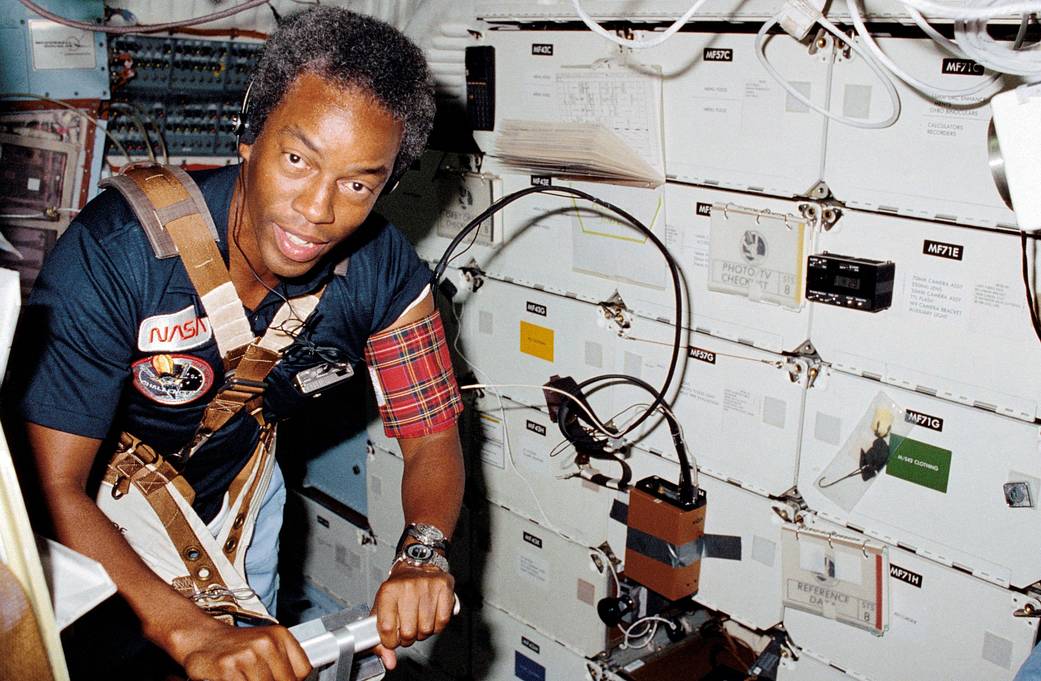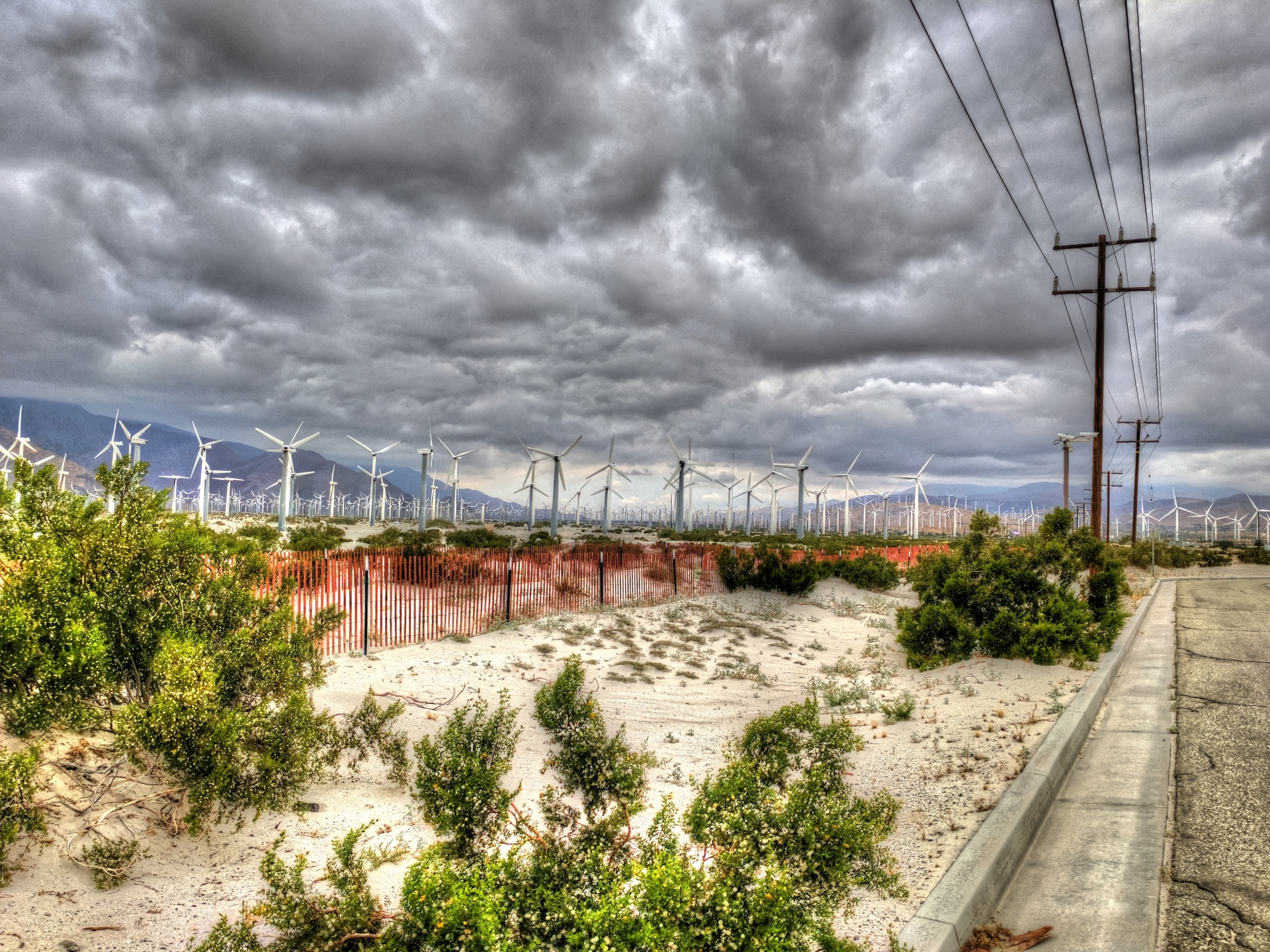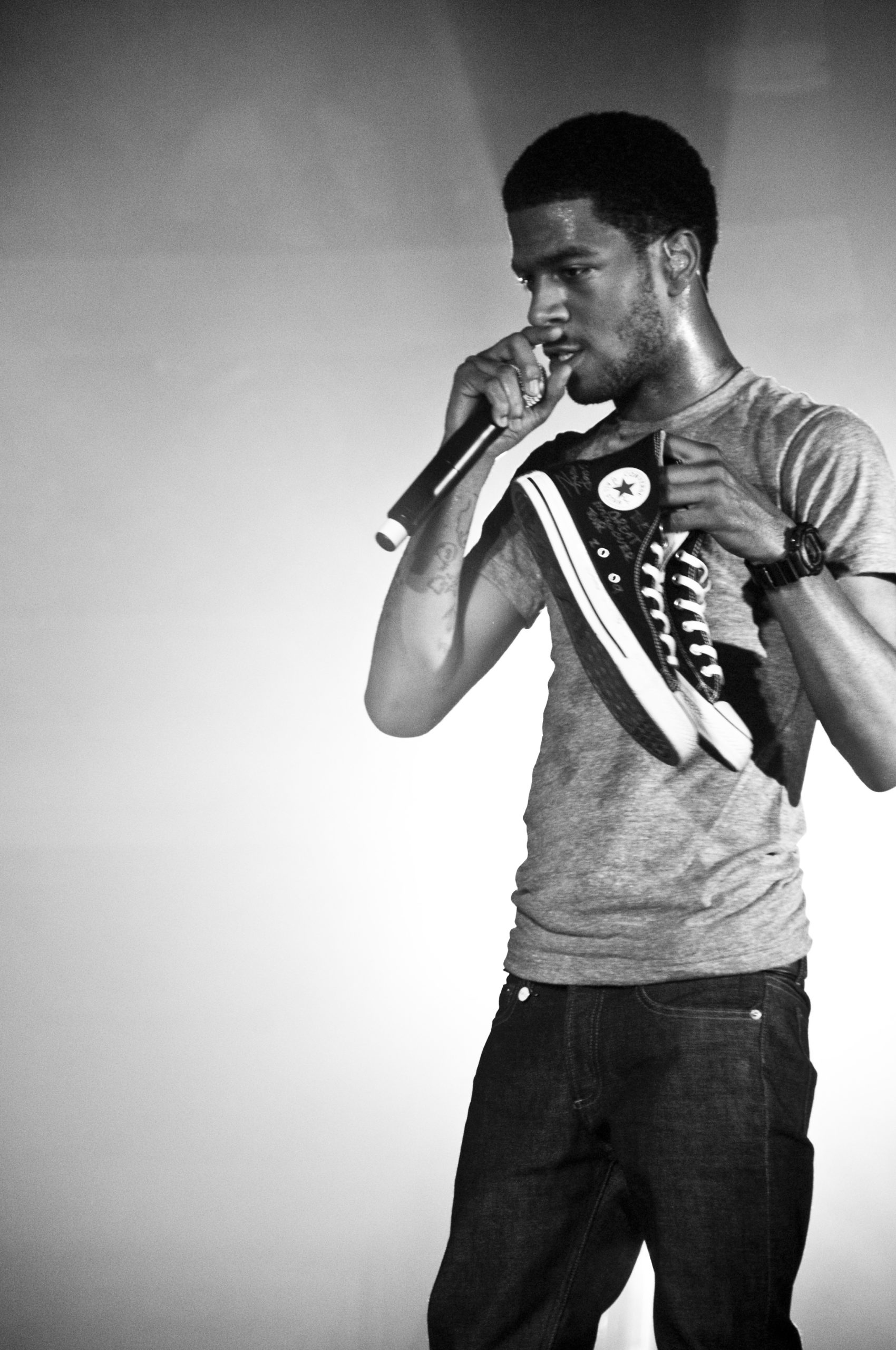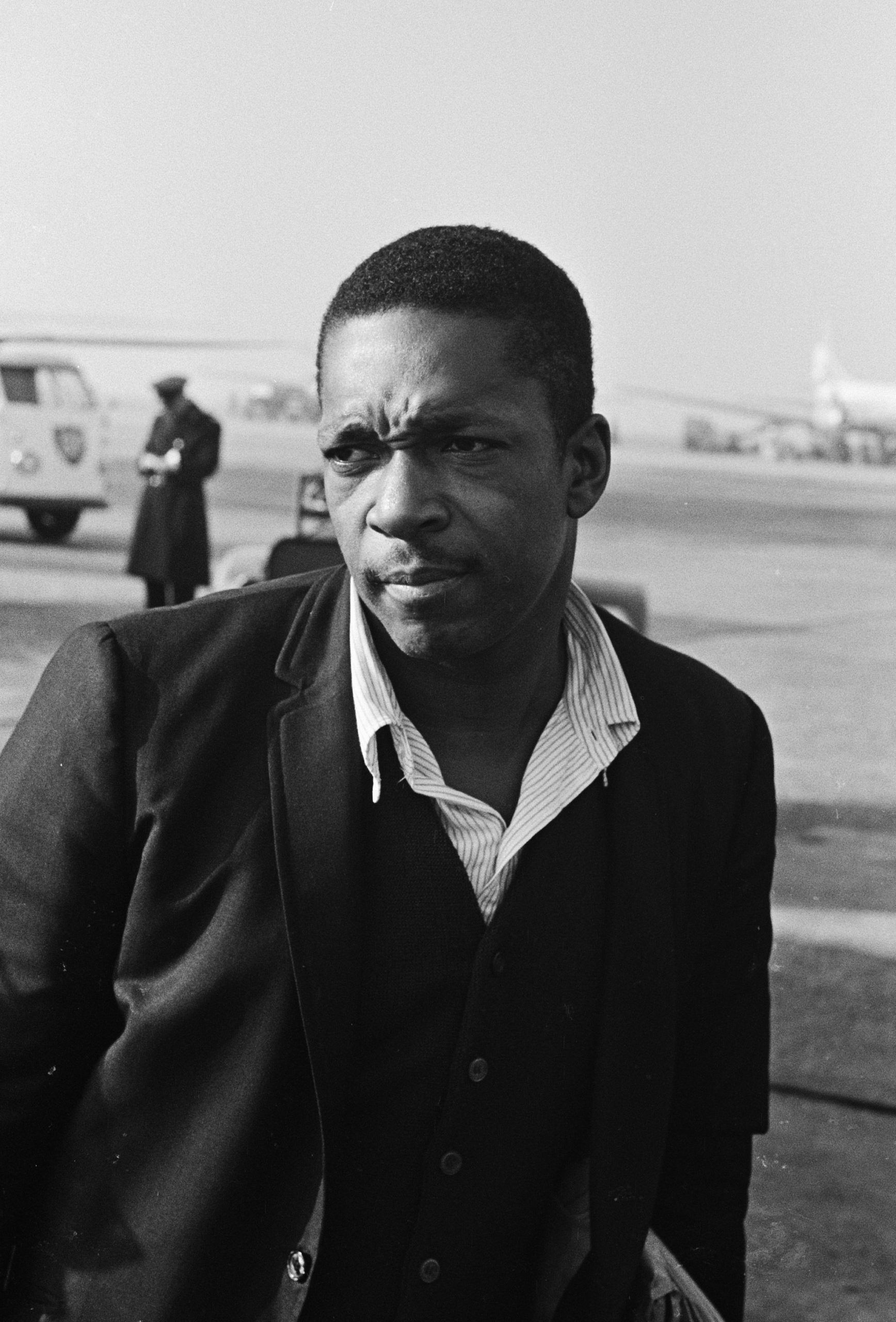Black Men on the Moon
Maya Beck charts a lineage of black trailblazers, from John Coltrane to Kid Cudi to her own father, examining the particular loneliness that arises when cultural innovators reach the outer limits of expectation, convention, and community knowledge.

My father lives in the middle of a desert. If you walk a couple of blocks, jump a fence, take the sidewalk until there is no more sidewalk, you can easily end up surrounded by nothing but faded shrubbery and dust. The mountains cup the landscape, and thin long wind turbines stand like alien plants as they catch the wind. There is a beautiful, palpable loneliness out there. You can easily end up feeling as alone as if on the moon.
I used to hike out into the desert alone, sit up high on the mountains and look down while wondering how my family ended up there. Led by my father, my family has ended up in so many places uninhabited by other black people, or at least unassociated with them. Sometimes it feels like we’re the First Black Family to live in a certain area, although that isn’t always true.
There are other black people in Palm Springs, however. Society tends to hide the ways in which black people are everywhere. I have argued to my dad that black people were very likely the original backbone of Palm Springs during its Hollywood heyday, and research bears this out:
“In 1956, Lawrence Crossley, Palm Springs’ first African American resident, bought twenty-acres just outside city limits and created a subdivision for people who worked in Palm Springs resorts and spas or as domestic servants for wealthy families but were barred from living in the city by archaic racial restrictions.”
Lawrence Crossley definitely knew how it felt to be the First Black Man.

***
“I never wanted to be a part of planet Earth, but I am compelled to be here, so anything I do for this planet is because the Master-Creator of the Universe is making me do it. I am of another dimension. I am on this planet because people need me.”
Sun Ra
But then they say I’m crazy, crazy, crazy, crazy
They got me thinking I ain’t human
Like I came in from above, above, above, above
Feeling like a bird sitting high
I be that man on the moon, I’m that man on the moon
And I’mma do what I do, so do you
Kid Cudi
***
I use the words and sounds of black men to understand my father and brother’s thoughts. My older and younger brother listened to Kid Cudi to cope with their own dark and lonely periods in majority-white schools. They debated his album-long foray into rock, Speedin’ Bullet 2 Heaven, although they were definitely less alienated than fans who expected only hiphop from a black man. Society tends to forget that black people invented rock.
When Scott Mescudi spoke out on his mental health and entered rehab, I felt the world become a little safer for my brothers, even the ones not related to me. They could face their demons. They could rock. They could cry. They could be a little more human.

I am still trying to parse my father’s Blues through music. I think the Blues overlaps with, but is not identical to, depression. My father described it like a force that haunted Chicago, an ambinance that could grip you and kill you. Coltrane tamed it into beauty—or no. Perhaps it got him too, too young.
My father fled the Blues by leaving the projects. He carried some with him—of course, Blues is in the blood of all us black diaspora descended from the survivors of slavery—but he dropped his vices of drinking or drugs, or whatever violence or world-anger or nihilism he had as a young man and scarcely mentioned to his children.
The first lunar tundra my dad stepped onto was the segregated boys’ school Lane Tech High. From there, he took off and landed:
on the mountains of Guatemala,
on the seasides of California and Baja California,
on the coniferous forest trails around Seattle/Tacoma,
captain of an earth-tone 1977 Brougham RV.
RVing is another interest black folks aren’t supposed to have. I may have only met one or two black families despite our years on the road. There is a National African American RVers Association, but their thousand-something members are still dwarfed by the nine million or so RV owners in America, however. They must still be lonely as they trek the dark expanse of the asphalt in their Challengers and Endeavors. I imagine that NAARVA’s rallies and convenings are an event as beautifully rare and soothing as an eclipse.
***
“I never even thought about whether or not they understand what I’m doing… The emotional reaction is all that matters as long as there’s some feeling of communication. It isn’t necessary that it be understood.”
John Coltrane
“I’m playing dark history. It’s beyond black. I’m dealing with the dark things of the cosmos.”
Sun Ra
“I don’t feel involved. I feel almost completely lost now, sometimes from almost everything. I feel sorry for the minorities, but I don’t feel part of one.”
Jimi Hendrix
***
Blackness exists through community. It’s carried through blood and skin but sustained by #blacktwitter memes, mixtapes sampling your daddy’s music, hiphop neologisms that explain too much for you to not use them, certain kinds of nods and handshakes. When you go out alone as a black man, the only blackness you have is that which you carry with you. How do you maintain that as a stranger in a strange land?
All innovators are alone, if not lonely. The most creative figures often worked far past expectations and conventions, at the outer limit of spirituality and sanity. Black innovation has that loneliness, as well as the particular threat of losing one’s blackness by straying too far. Black folks cannot be alone in the woods for their own safety. They can’t be Buddhist or vegan or geek or minimalist or transcendentalist because those are much too luxurious. We must be a certain level of engaged and enraged, or else we doesn’t care enough. If we don’t resist in the right way, then all black people are weakened.

The one-drop rule can become binary thinking: you are with us or against us, a real one or an Uncle Tom. And if the moon is not part of our community, then the men up there are something like traitors: Black audiences lose interest in jazz, and Coltrane plays his Slonimsky-influenced high art for increasingly white crowds. Jimi gets booed by black audiences in Harlem. Society forgets that black Detroiters and Chicagoans invented EDM, and that raves are the children of block parties.
At the final frontier of art, it’s hard to tell if you’re alienated from your blackness or because of your blackness, and its contrast with the wider, whiter world. Some of the artists I most admire struggled with their blackness. Some denied it, ignored it, disowned it, or downplayed it. They became more singular, but they became more alone.
***
“I hate rapping, […] because it puts you in this box.”
Tyler The Creator
“Creative genius, that’s my title. My title is not rapper anymore. It’s not that.”
Kanye West
“The use of the term [Jazz], I feel, is inadequate in its description of the music created through John. A higher principle is involved here. Some of his latest works aren’t musical compositions. I mean, they aren’t based entirely on music. A lot of it has to do with mathematics, some of it on rhythmic structure and the power of repetition, some on elementals. He always felt that sound was the first manifestation in creation before music.”
Alice Coltrane on John Coltrane
***
Nowadays, I think that whiteness is the source of alienation. It draws up limitations and tells us that there are ways we can and cannot be. It withholds capital and freedom, gives us fears and scarcity and typecast roles.
The solution is acceptance on both ends. The black astronaut must call home and home must answer the call. If a black astronaut decides to join a metal band or develop a twelve-tone ballet, we can support them, listen and watch. We can turn metal and ballet and anything black, if the first frontiersman invites us in after them. An astronaut should have an umbilical cord or something to tether them home.
Guion Bluford invited us up. Octavia Butler too, despite her solitude. And Bernard Anthony Harris Jr. and Mae Jemison and Misty Copeland and Samuel R. Delany and Alice Coltrane and Madam C. J. Walker and Alexander Twilight and every black cowboy and my father and I know the solitude of being the first and having a vision.
I want to go wherever I want without fear of losing my blackness. What would that look like? Carrying my ancestry in a knapsack, I will take great weightless leaps, leaving footprints on the white dust. I will tag it, write my name. I want to say, this too is ours, or will be, or always was.
I’ll be that man on the moon.
This article was commissioned and developed as part of a series by guest editors Free Black Dirt.